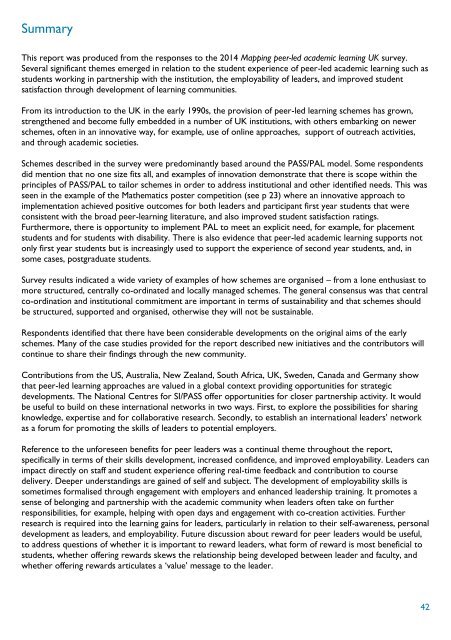Peer_led_learning_Keenan_Nov_14-final
Peer_led_learning_Keenan_Nov_14-final
Peer_led_learning_Keenan_Nov_14-final
Create successful ePaper yourself
Turn your PDF publications into a flip-book with our unique Google optimized e-Paper software.
SummaryThis report was produced from the responses to the 20<strong>14</strong> Mapping peer-<strong>led</strong> academic <strong>learning</strong> UK survey.Several significant themes emerged in relation to the student experience of peer-<strong>led</strong> academic <strong>learning</strong> such asstudents working in partnership with the institution, the employability of leaders, and improved studentsatisfaction through development of <strong>learning</strong> communities.From its introduction to the UK in the early 1990s, the provision of peer-<strong>led</strong> <strong>learning</strong> schemes has grown,strengthened and become fully embedded in a number of UK institutions, with others embarking on newerschemes, often in an innovative way, for example, use of online approaches, support of outreach activities,and through academic societies.Schemes described in the survey were predominantly based around the PASS/PAL model. Some respondentsdid mention that no one size fits all, and examples of innovation demonstrate that there is scope within theprinciples of PASS/PAL to tailor schemes in order to address institutional and other identified needs. This wasseen in the example of the Mathematics poster competition (see p 23) where an innovative approach toimplementation achieved positive outcomes for both leaders and participant first year students that wereconsistent with the broad peer-<strong>learning</strong> literature, and also improved student satisfaction ratings.Furthermore, there is opportunity to implement PAL to meet an explicit need, for example, for placementstudents and for students with disability. There is also evidence that peer-<strong>led</strong> academic <strong>learning</strong> supports notonly first year students but is increasingly used to support the experience of second year students, and, insome cases, postgraduate students.Survey results indicated a wide variety of examples of how schemes are organised – from a lone enthusiast tomore structured, centrally co-ordinated and locally managed schemes. The general consensus was that centralco-ordination and institutional commitment are important in terms of sustainability and that schemes shouldbe structured, supported and organised, otherwise they will not be sustainable.Respondents identified that there have been considerable developments on the original aims of the earlyschemes. Many of the case studies provided for the report described new initiatives and the contributors willcontinue to share their findings through the new community.Contributions from the US, Australia, New Zealand, South Africa, UK, Sweden, Canada and Germany showthat peer-<strong>led</strong> <strong>learning</strong> approaches are valued in a global context providing opportunities for strategicdevelopments. The National Centres for SI/PASS offer opportunities for closer partnership activity. It wouldbe useful to build on these international networks in two ways. First, to explore the possibilities for sharingknow<strong>led</strong>ge, expertise and for collaborative research. Secondly, to establish an international leaders’ networkas a forum for promoting the skills of leaders to potential employers.Reference to the unforeseen benefits for peer leaders was a continual theme throughout the report,specifically in terms of their skills development, increased confidence, and improved employability. Leaders canimpact directly on staff and student experience offering real-time feedback and contribution to coursedelivery. Deeper understandings are gained of self and subject. The development of employability skills issometimes formalised through engagement with employers and enhanced leadership training. It promotes asense of belonging and partnership with the academic community when leaders often take on furtherresponsibilities, for example, helping with open days and engagement with co-creation activities. Furtherresearch is required into the <strong>learning</strong> gains for leaders, particularly in relation to their self-awareness, personaldevelopment as leaders, and employability. Future discussion about reward for peer leaders would be useful,to address questions of whether it is important to reward leaders, what form of reward is most beneficial tostudents, whether offering rewards skews the relationship being developed between leader and faculty, andwhether offering rewards articulates a ‘value’ message to the leader.42


